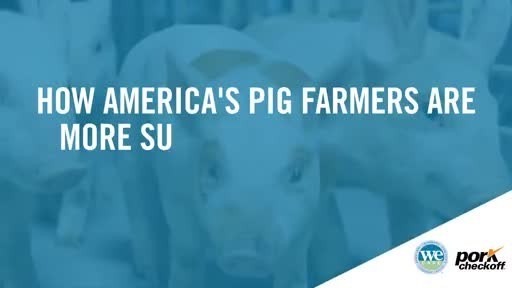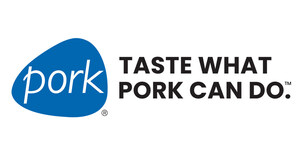
Study Shows Pig Farmers Make Massive Environmental Sustainability Strides
DES MOINES, Iowa, April 18, 2019 /PRNewswire/ -- For almost five decades, the world has celebrated April as Earth Month. In just a little longer than that same time period, U.S. pig farmers made massive strides in building environmental sustainability on their farms through more efficient use of feed, water, land and energy use.
A recent University of Arkansas study found that continuously improving production practices and evolving technology have helped pig farmers become even more environmentally responsible. Today, pig farmers are making better use of natural resources and are gradually decreasing the environmental footprint of each pound of pork produced.
According to the study, A Retrospective Assessment of U.S. Pork Production: 1960 to 2015, the U.S. pork industry experienced many structural changes over 55 years, including continual improvements in the supply chain. Without the significant gains in reducing the footprint of production that occurred during this time, the cumulative environmental impacts for the whole sector would be much larger today.
The sharpest gains in sustainability came in land use driven by grain farmers more efficiently raising feed grains, such as corn and soybeans, and pigs more efficiently using that feed. Per pound of pork produced, land use declined by more than 75% from 1960 to 2015, and water use declined by more than 25%.
To save as much water as today's pig farms do over their predecessors of 50-plus years ago, the average American would have to take 90 fewer showers per year. Likewise, to understand the energy savings accomplished by pig farmers during the study period, a typical household would need to eliminate the use of a refrigerator altogether.
Underpinning the advancements in sustainability is an evolving technology toolset that many pig farmers put to work today in the areas of feed nutrition, animal genetics and overall pig care. Advancements in feed and feed efficiency have driven much of pig farming's shrinking environmental footprint. Feed conversion grew by 38% in the 55 years leading up to 2015, with only three pounds of feed required to produce a pound of pork today versus 4.5 pounds of feed in 1960. Pigs now enter the marketplace, on average, 81 pounds heavier than the 200 pounds per head in 1960 standards.
"Pig farmers like me have always depended on a healthy environment to be successful, and with the tools at our disposal, we are better stewards of the environment today," said Steve Rommereim, National Pork Board president and a pig farmer from Alcester, South Dakota. "With the huge strides we've made as pig farmers, we are raising a high-quality, nutritious and consistent product today. The improved productivity is accompanied by sharp gains in environmental sustainability."
Earth Month is an opportunity to recognize the environmental sustainability advancements of pig farming in the last five decades and explore new ways to improve on those advancements.
"We look forward to further improving our future sustainability and environment in the decades to come. Our industry and the livelihoods of thousands of farm families depend on it," Rommereim said.
- Watch a video recapping pig farmers' environmental sustainability efforts.
- See the full University of Arkansas study.
- Learn about the environmental sustainability ethical principles pig farmers follow.
The National Pork Board has responsibility for Checkoff-funded research, promotion and consumer information projects and for communicating with pork producers and the public. Through a legislative national Pork Checkoff, pork producers invest $0.40 for each $100 value of hogs sold. Importers of pork products contribute a like amount, based on a formula. The Pork Checkoff funds national and state programs in advertising, consumer information, retail and foodservice marketing, export market promotion, production improvement, science and technology, swine health, pork safety and sustainability and environmental management. For information on Checkoff-funded programs, pork producers can call the Pork Checkoff Service Center at (800) 456-7675 or visit pork.org.
Contact: Kevin Waetke
National Pork Board
515-223-2638
[email protected]
SOURCE National Pork Board







Share this article